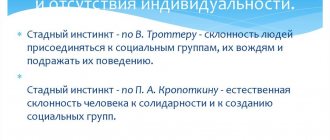- Why doesn't maternal instinct exist?
- Isn't the desire to have a child part of evolution?
- If not instinct, then what?
- What about hormones?
- Social attitudes and their consequences
It is believed that women are biologically programmed to want children. And once they give birth, they somehow immediately learn how to take care of them. It is accepted in society that all women should experience a feeling of endless, selfless love for their children. But in fact, everything is much more complicated and in reality there is no maternal instinct . The idea that as a woman you by default want children (and "instinctively" know what to do with them once they're born) is unrealistic
and is the cause of disappointed expectations, disappointment, unnecessary worry, stress and even depressive thoughts.
In this article we will figure out why there is no maternal instinct , what a person can actually have
and
why it has little to do with gender and childbirth
.
Why doesn't maternal instinct exist?
The myth of the maternal instinct permeates all human cultures, from the Catholic Virgin Mary to the Hindu mother goddess. Motherhood is considered the most natural state, the personification of femininity, leaving a childless woman an object of pity (and such an attitude in itself is wrong, but that’s not what the article is about). However, there is no switch in a woman that is ready to go off as soon as she places her baby on her breast or even just finds out that she is pregnant
.
The word “instinct” itself is understood as an innate program of behavior that is carried out automatically by an individual. Instincts are not learned; they cannot be acquired artificially. Unlike animals, we can say that people have no instincts at all
, because most of these innate programs are rigid, unchangeable and caused by a simple stimulus, and people are quite flexible and easily adapt to almost any conditions.
Check out our article for more details on why humans don't have instincts
We have reflexes, life needs and social attitudes
.
After birth, we learn for some time to walk, talk, and distinguish between edible and inedible. A person cannot reproduce and care for offspring without training
. This alone suggests that the concept of maternal instinct is fundamentally incorrect.
Social side of the issue
Some psychologists are of this opinion. The female body is designed so that she can bear, give birth, and feed a child. But there is also the influence of society, which can in some situations completely suppress the desire to become a mother. This does not mean that the population on the planet will die out, because by nature a woman has the desire to give birth to a child.
If we look at examples from history, we can see a tendency that some nations used to consider it the norm to get rid of children. In Japanese villages, it was allowed to kill a newborn girl, because it was impossible for her to find a worthy groom, since fewer boys were born and many did not live to adulthood. The Bedouins tried to get rid of little girls, because it was believed that they would not be of much use. If you delve into history, you will notice how often cases of taking the lives of infants occurred, and this was considered the norm among many nations.
Nowadays, modern women understand that motherhood is a huge return in psychological, emotional, physical, and material terms.
Many people believe that you first need to get an education, achieve career growth, earn money, and only then think about a full-fledged family. In our society, consumer desires come to the fore. Nowadays there is no condemnation for the fact that a woman thinks about herself first and postpones the birth of a child until favorable times. Nevertheless, our birth rate is at a fairly high level, but this does not mean that women began to listen to their instinct, pushing other values into the background. Many become mothers because “it’s customary” that there should be children in the family. Some people give in under pressure from their own parents, who want to become grandparents.
Isn't the desire to have a child part of evolution?
It's true, from an evolutionary perspective, humans are programmed to procreate. A woman's body undergoes many hormonal changes during pregnancy, and of course this release of hormones affects behavior, perception and emotions. Shifts in estrogen and the release of oxytocin—the “love hormone”—stimulate connection, affection, and attraction. However, the desire to become a mother is not always innate and many healthy women do not experience maternal desire
.
Moreover, many people - both women and men - prefer not to have children.
Some of them love children, want to take care of them, educate them, and communicate. They usually realize their desire to care for children in another way - by becoming dedicated coaches or, for example, generous and caring teachers. From this point of view , what is called “maternal instinct” is more logically called “the desire to care”
.
Shifting your focus will help you see these behaviors where they exist—all around us. The desire to be cared for is not limited to mothers or fathers and is not gender specific
.
But it does not arise automatically and does not apply to everyone
- that is, it is not an instinct.
Give birth for health
This statement in itself is absurd, because every medical professional will tell you: pregnancy is a colossal burden on the body. Starting with hormonal changes and ending with the waste of immunity and other physiological stories - for example, the expansion of the pelvic bones in women shortly before childbirth.
As always, everything is relative, and there are no clear conclusions in this matter. For example, a study by Miguel Porter and Paul Schweinzer showed that women who have at least one child are half as likely to die from infectious diseases, three times less likely to die from cardiovascular pathologies, and four times less likely to die from various forms of cancer. But Mette Moen's work notes a decrease in the risk of developing endometriosis for several years after childbirth. In addition, scientists have found a correlation between the duration of breastfeeding and the likelihood of developing breast cancer: the longer you breastfeed, the lower the risk of cancer.
However, there are other studies: according to Russian and foreign studies, pregnancy and childbirth on average increase the likelihood of developing tuberculosis and stroke by 3 times, deep vein thrombosis by 5 times, and also aggravate chronic kidney, cardiovascular and endocrine diseases in women. systems, increase the risk of retinal detachment, etc.
If not instinct, then what?
Just as a child learns everything after birth, in the same way a mother and father learn to be parents.
– through role models and observation.
This learning occurs from the moment a child is born (and not necessarily their own - some begin to learn this, for example, when they are forced to babysit younger brothers or sisters). Many people assume that after giving birth, maternal instinct should kick in and lead to an instant feeling of love. In fact, according to a 2021 study, feelings of attachment develop a few days after birth
.
Note that the feeling of love - both in the mother and in the father - may appear much later
: after months or years.
Or it may not appear at all
, and these are absolutely normal situations.
Maternal instinct is often called a certain sixth sense.
, which appears from intense intimacy and more than close communication with the baby.
And this doesn't just apply to mothers. If a father, mother, grandmother, grandfather, and even a stranger
spends hours with a child, constantly thinks about him, wants to take care of him,
such a feeling will definitely appear
.
When parents interact with their children, they learn parenting skills through practice and experience. That same maternal (parental) intuition can be associated with experience, temperament and attachment style.
For example, a parent may quickly infer the specific meaning of their newborn baby's cries. He can also easily detect changes in behavior that signal health problems in the baby. This also applies to older children. Parents may feel that something is wrong with their teenager. Sometimes even small changes in behavior that are not caught on a conscious level
.
Thus, many aspects of maternal instinct are a myth
. Although some of these processes may be “unconscious”, this does not mean that they are instinctive.
Postpartum depression
Unfortunately, the media often tells horror stories of mothers intentionally harming or even taking the lives of their babies. How can this happen if it is in a woman’s nature that when she hears her child crying, she immediately runs to calm him down? We are talking about obvious mental disorders that occur in a fairly large number of young mothers.
Postpartum depression is a common condition that many people confuse with fatigue and hormonal surges.
In mild forms, postpartum depression goes away on its own, but relatives need to give the young mother the opportunity to rest and take care of herself. Severe forms of postpartum depression can lead to sad stories, especially if relatives have a history of mental disorders.
Signs of postpartum depression:
- isolation, silence;
- constant desire to lie down and not move;
- sudden mood swings;
- sleep problems;
- feeling of anxiety;
- irritability;
- tearfulness;
- aggression towards other family members and the baby;
- lack of appetite.
You should immediately consult a psychotherapist if the behavior of a young mother causes anxiety. She may not realize now that she could harm herself or her baby, but she will regret it in the future if she does not get timely help.
What about hormones?
When you become a parent—biologically or otherwise—your brain chemistry changes. This doesn't just happen to the person giving birth.
, that is, with the biological mother.
In fact, research shows that fathers and stepparents also experience increased levels of oxytocin, serotonin, and dopamine during the transition to parenthood
. This change comes from the connecting actions between the teacher and the child. It also turned out that men and women are equally skilled at recognizing the cries of babies.
Researchers have found that the amount of time a parent spends with their child
, directly correlates with the ability to identify his cries.
But the gender of the parent has nothing to do with this
. This fact once again confirms the idea that maternal instinct is just a myth.
Hormones hit my head
Hormones are important in regulating human life, but they do not control everything. While it is still possible to control a person’s feelings, it is almost never possible to control his actions. Thus, experiments that included studying the effects of androgens, oxytocin, prolactin and cortisol showed that the activity of the cerebral cortex, which determines the choice of one or another action strategy, plays a significant role in the formation of human behavior. By the way, after the birth of a child, oxytocin increases not only in women, but also in men - this is already a proven fact. But this is provided that both take an active part in the child’s life.
First meeting
The first meeting with a newly born baby always leaves a vivid impression, but sometimes it also puts parents in an awkward position. Most often, mom and dad imagine a smooth, pink and plump little one, but in reality a dirty, red, not very beautiful baby may appear in front of them. And, of course, in order to get rid of the picture of the ideal image of a newborn and happily accept your own baby, it will take time. But sometimes something happens at that moment when a child, wrapped in a swaddle, like a gift, is placed on the mother’s stomach, and she is captured by the warmth and tenderness that comes from nowhere. The baby will cry - and the woman will feel like a mother.
Love and protect
The baby and mother are developing “toward each other.” The baby adapts to the mother’s capabilities, skills and awkwardness, to the peculiarities of her voice and movements; the mother learns to do everything correctly, becomes more dexterous, confident, and better understands the needs of the child. Thus, the primary “mother-child” connection is established and strengthened between them, which will remain the main one until the time the child learns to speak.
Mental stress and awareness of incredible responsibility changes the life of a young mother forever.
At first, love has a dual structure: love and anxiety, tenderness and responsibility are closely intertwined. For true love to develop between mother and baby, it takes more than breast milk or play. The beginning of a unique relationship between mother and child begins when the woman realizes that from now on there is something of him in her, just as there is something of her in him. Only in this way, “leaning” on each other, will mother and baby be happy: she will develop her love, and he will grow, feeling loved and protected.
Fine tuning
By correctly perceiving the phenomenon of maternal instinct, every young mother can help herself tune in and strengthen its manifestations on her own.
1. Analyze your relationship with your own mother, the values of family and child. If you understand that you did not get positive ideas about the meaning of motherhood from interacting with your mother, you cannot understand your own motives for having a baby, or you feel insecure, it is better to solve these problems before the child is born. It may not be a bad idea to seek the help of a psychologist, because an adequate attitude to your personal history and timely resolution of psychological problems will help you find harmony with your inner world in the present and “allow” the maternal instinct to manifest itself.
2. Start playing “mother-daughter” during pregnancy. Don’t put off thinking about your baby until later, think more about what he will be like when he is born, dream about what you would like to do with him. You can even express your thoughts in a diary or depict them in a drawing. The more visual and material your idea of the child is, the more feelings you will be able to experience and the sooner the maternal instinct will awaken. Start making pleasant purchases, surrounding yourself with cute baby things, think through in advance the everyday issues associated with the appearance of a baby in your life. Such preparation will help you gradually tune in to motherhood and relieve you of unnecessary hassle and worries after childbirth.
3. Try to ensure that the process of childbirth and the postpartum period is as natural as possible. Maternal instinct is largely determined by the production of hormones during pregnancy, childbirth and breastfeeding. But if childbirth was accompanied by increased stress, excessive pain, surgery or the use of medications, the natural hormonal balance may be disrupted. The same applies to breastfeeding, which in turn can slow down the emergence of the maternal instinct. Therefore, it is worth preparing for childbirth (both physically and psychologically), consciously approaching the choice of maternity hospital and doctor, putting the baby to the breast and feeling physical contact with him in the first minutes of his life. All this is necessary in order for the biological factor of maternal instinct to kick in faster.
4. Focus on the child and contact with him. Breastfeeding and co-sleeping are the best helpers in the development of maternal instinct. The special smell of a child, his warmth, look, appearance, peculiar sounds and defenselessness awaken in a woman the need to care and protect a small creature, and the baby’s responses to the mother’s activities are the desire to communicate with him and the pleasure of interaction. But to do this, you need to give yourself the opportunity to feel contact with the child: carry him in your arms, care for him yourself and watch him. The closer you are, the more you can feel the emotional connection.
5. Find helpers with household chores and learn to relax. It often happens that a young mother immediately after the maternity hospital is immersed in everyday problems, trying to do everything at once, and does not notice that she is in constant tension, already bordering on postpartum depression. Allow yourself to be just a mother and a happy woman for a while, try not to think about all sorts of things. The time will come for them, but for now they can be entrusted to loved ones. Be alone with yourself and your baby and let mutual affection awaken.
Maternal instinct does not come according to a schedule, it is not something innate and taken for granted for every woman. Of course, most expectant mothers have its prerequisites, but many factors influence when and to what extent it will manifest itself.
This is what he is...
How to understand whether a woman has a maternal instinct or not? Objectively, it manifests itself in the emergence of certain needs in a woman:
- in the desire to communicate with your baby, play with him, teach, develop, and always be nearby. Satisfying this need brings her pleasure;
- in the care and protection of the baby - the desire to feed, care for, caress the child, protect him from the threats of the outside world and the consequences of his own activity;
- in maternal feeling - the experience of a special emotional state that is evoked in a woman by her child or even thoughts about him. This feeling arises due to ideas about the baby, his image, family and cultural traditions of motherhood and the woman’s own experience.
Do you want to become one of more than 100,000 users who regularly use kiozk to gain new knowledge?
Don't miss the main thing with our telegram channel:
What is the way out of the situation? How to really evaluate yourself? Let's draw simple conclusions.
- If you have a strong maternal instinct, this is good for you and your children, even future ones.
- If it’s not there, that’s good too. The nature of every woman allows her to make the right decisions. If there are already children, the mother simply expresses care differently - not like others.
Accept yourself for who you are, don’t look for complex answers to simple questions and look up to others.
You have problems? Do you need a psychologist? Call, write right now!
Skype OlegVZobnin Phone +7(987) 955–49–56 WhatsApp +7(987) 955-49-56 Viber
Materials of the current Rubric
Maternal instinct is absent or highly developed
Beloved mother, technology how to fall in love
Man has patterns
Parents, children's love for parents
Recognition from parents
Empathy is the human ability to sympathize
Resentment, how to work
Return to childhood
For a woman who is preparing to become a mother or is already witnessing the beginning of a new life, it is quite natural to return to her own childhood, to her most intimate memories, to the child in herself. At the same time, the image of her mother inevitably appears before her. Warmth, gratitude, tenderness can be associated with this image, and then these experiences become very important support for accepting one’s own motherhood. Moreover, the image of a mother can be a good example to follow, a hint on how to behave in unexpected situations. However, sometimes the image of the mother can be associated with grievances or feelings of abandonment, abandonment, and misunderstanding. Then the woman needs to sort out her relationship, because an unconscious desire not to be like her mother can prevent her from accepting her own maternal image. When unpleasant, painful experiences arise, when immersed in memories of her childhood, or when she is completely indifferent to these memories, a woman should find another example of a maternal relationship that could become suitable support for her.
No woman avoids encounters with her adolescence and childhood. Returning to the past sometimes makes her more infantile, helpless, and capricious. But if she is confident in her surroundings and feels safe, then, immersing herself in childhood, she comes into contact with the experiences that she needs to understand the child, to accept his helplessness and weakness.
A man can become a father at any age
This is also a misconception. Although the male body does produce sperm from the beginning of puberty until death, unless some disease interferes with the process. So, theoretically, men’s “watches” are really different. However, it has already been proven that older fatherhood is just as dangerous as mature motherhood. The risk of physiological and mental disorders in the unborn fetus increases after the age of 40 in men. Thus, the risk of developing autism spectrum disorders in children whose fathers have crossed the 50-year mark is 0.52%, which is almost 9 times higher than in children of 20-year-old men. Important: maternal age does not affect the risk of having children with autism spectrum disorders.
This dependence is also typical for other diseases: congenital malformations, for example hydrocephalus (4.2% probability in children of 50-year-old fathers, 2.2% in 25-year-olds), heart disease (17.2% and 12.1% respectively), esophageal atresia (2.9% and 0.9%, respectively). By the way, the expectant mother is also under threat: according to statistics, pregnancy complications (preeclampsia, placental abruption, hypertension, etc.) in women giving birth to children from partners over 45 years of age increase by 1.5-1.8 times compared to that the same probability among women whose partners were between 25 and 35 years old.
So everything is relative! Checkmate, those who like to hurry. Mind your own business and you will be happy.
based on materials from knife.media, 5da.ru.











